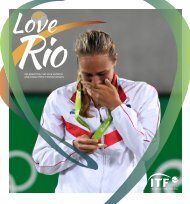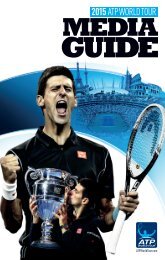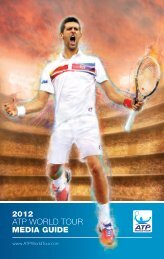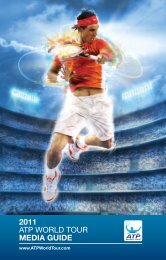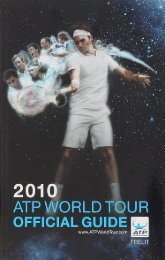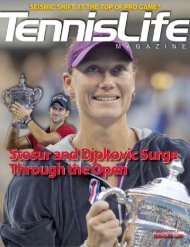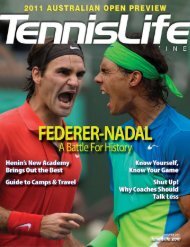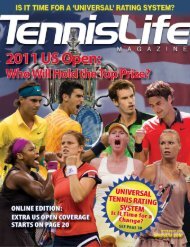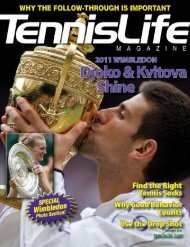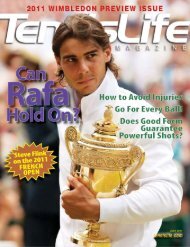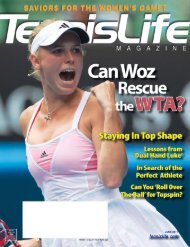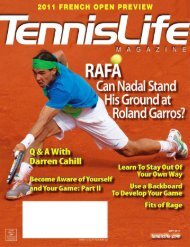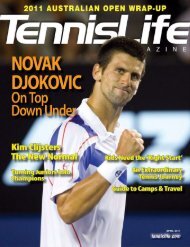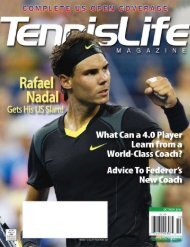A Champion's Mind - Pete Sampras
www.tennismoscow.me Insta:TENNISMOSCOW
www.tennismoscow.me Insta:TENNISMOSCOW
You also want an ePaper? Increase the reach of your titles
YUMPU automatically turns print PDFs into web optimized ePapers that Google loves.
are and precious, and I really felt the heat when I gave one away—and it was really dispiriting to blow a<br />
chance to score one.<br />
People sometimes said that the “problem” with grass-court tennis during the years I dominated at<br />
Wimbledon was that a big server could just serve any opponent off the court. But the reality is that<br />
winning at Wimbledon was never just about serving big. The biggest servers in the game didn’t win<br />
Wimbledon; the great servers who did take the title often won other majors as well. Goran Ivanisevic<br />
could serve me off the court anywhere, he was scary to play. Yet he only won one title at Wimbledon, and<br />
that was very late in his career. Roscoe Tanner, one of the most deadly servers of the Open era, got to just<br />
one Wimbledon final, and lost to Björn Borg.<br />
Actually, Wimbledon has produced fewer one-slam wonders than the serve-neutralizing, theoretically<br />
“level playing field” of Roland Garros clay. The bottom line is that the big titles are almost always won<br />
by great players, because they have superior execution (everyone has great basic strokes) and the<br />
strongest hearts and minds, and they find ways to win.<br />
Todd Woodbridge had a career singles run at Wimbledon in 1997, making it all the way to the semifinals.<br />
Although he is one of the all-time doubles greats, Todd had trouble translating his skill to singles. He had<br />
great technique and finesse, and he was very crafty. But he didn’t make a lot of power and he didn’t move<br />
great (in doubles, he only had to worry about half the court). Todd’s weaknesses played right into my<br />
strengths, and I had little trouble with him. Once again, I found myself facing Cédric Pioline in the final.<br />
I felt for Cédric, because even though he had played a previous Grand Slam final against me at the U.S.<br />
Open, this was different—no tournament feels as historic as Wimbledon. There was no pressure on him; I<br />
was the prohibitive favorite. His best chance lay in going out there and just letting it rip—what did he<br />
have to lose? But that’s easier said than done.<br />
Once again, as in our U.S. Open final, Cédric seemed overwhelmed. I won the first two sets, giving up<br />
just six games. I was on top of my game and in touch with the Gift. It seemed like just minutes after the<br />
start of the match, yet there I was, serving at 5–4 in the third. I found myself thinking, Wow, this is too<br />
easy. I don’t mean to be disrespectful toward Cédric. It was just that the match was on my racket, far<br />
sooner and with far less difficulty than I expected.<br />
I had this flash as I got within two points of the match: Man, this is so big, what I’m doing—this is it.<br />
Wimbledon. It’s huge. . . . And I was immediately overcome by this feeling of insecurity. I panicked, like<br />
someone having an anxiety attack. I thought, Is it really supposed to be so easy? Am I missing something<br />
here? Is this all going to turn out to be some kind of joke or hoax, on me? In a very real, visceral way,<br />
it was like a great dream, the kind in which you feel omnipotent, but a part of you knows that at any<br />
moment you might wake up and destroy the illusion.<br />
But I didn’t wake. I coasted across the finish line in straight sets, giving up a total of ten games. It was a<br />
fitting end to one of the least eventful or significant of my Wimbledon tournaments. I didn’t have any epic<br />
battles or showdowns with career rivals. Yet my performance at Wimbledon in 1997 may have been my<br />
best, in terms of having full control of my game and using it to maximum advantage for the longest<br />
sustained period. One stat said it all: I served 118 games, and held 116 times.<br />
I had every reason to feel confident about the U.S. Open a couple of months later. I was playing some of<br />
the most dominating tennis of my career, and I had a great draw for the year’s last major. For starters, I<br />
sliced my way through three relative unknowns—Todd Larkham, Patrick Baur, and Alex Rădulescu,<br />
losing just thirty games (numbers almost identical to my previous Wimbledon stats) as I cruised into the



